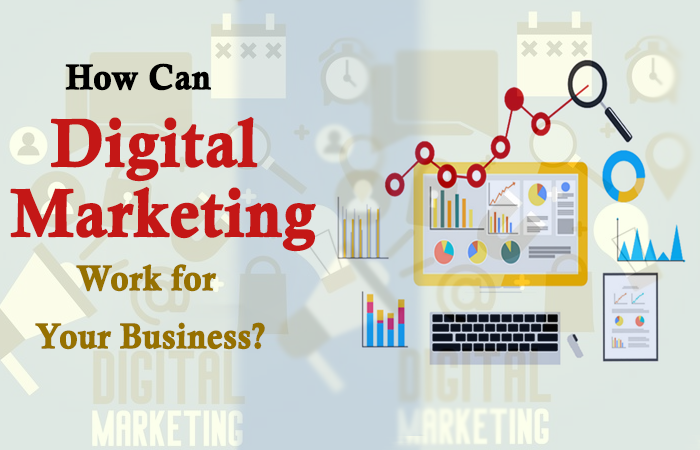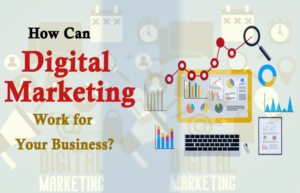Digital marketing plays a pivotal role in the growth and success of modern businesses. By leveraging online platforms and tools, businesses can reach a broader audience, engage with customers more effectively, and ultimately drive sales and revenue. Here’s a detailed exploration of how digital marketing contributes to business growth:
1. Increased Reach and Visibility
– Global Reach: Unlike traditional marketing, digital marketing isn’t bound by geography. Businesses can reach a global audience through online channels like social media, search engines, and websites. This expanded reach allows even small businesses to access international markets and compete with larger companies.
– Targeted Advertising: Digital marketing enables businesses to target specific demographics, interests, and behaviors, ensuring that marketing efforts are directed towards the most relevant audience. This precision increases the likelihood of conversion and reduces wasted marketing spend.
2. Cost-Effectiveness
– Lower Advertising Costs: Compared to traditional media like TV, radio, or print, digital marketing is often more cost-effective. Pay-per-click (PPC) advertising, for example, allows businesses to set budgets and only pay when users click on their ads. Social media marketing can also be done on a relatively small budget, yet still reach millions of users.
– Measurable ROI: Digital marketing provides detailed analytics that help businesses track the return on investment (ROI) of their campaigns. This transparency allows businesses to adjust their strategies in real-time to maximize effectiveness and reduce costs.
3. Enhanced Customer Engagement
– Two-Way Communication: Digital marketing platforms, such as social media and email, allow for direct communication with customers. Businesses can engage in conversations, respond to queries, and gather feedback, fostering a stronger relationship with their audience.
– Personalization: With data-driven marketing, businesses can create personalized experiences for their customers. Personalized emails, product recommendations, and targeted ads increase customer satisfaction and loyalty, leading to repeat business and long-term growth.
4. Data-Driven Decision Making
– Access to Analytics: Digital marketing tools provide valuable insights into customer behavior, campaign performance, and market trends. Businesses can analyze this data to make informed decisions, optimize their marketing strategies, and predict future trends.
– Real-Time Adjustments: Unlike traditional marketing, digital marketing campaigns can be adjusted in real-time based on performance data. If an ad isn’t performing well, it can be tweaked or replaced immediately, ensuring that marketing efforts are always optimized for success.
5. Improved Customer Experience
– Convenience: Digital marketing makes it easier for customers to interact with businesses. They can browse products, read reviews, and make purchases from the comfort of their homes. A seamless online experience encourages more frequent interactions and increases customer satisfaction.
– 24/7 Availability: With a digital presence, businesses can be available to their customers around the clock. Automated chatbots, e-commerce sites, and online customer support ensure that customers can engage with the business whenever they choose.
6. Brand Awareness and Credibility
– Online Presence: A strong online presence is crucial for building brand awareness. Regularly updated websites, active social media profiles, and engaging content help establish a business as a credible and authoritative source in its industry.
– Content Marketing: By creating and sharing valuable content, businesses can position themselves as thought leaders in their field. This not only attracts potential customers but also builds trust and loyalty among existing ones.
7. Scalability and Flexibility
– Scalable Campaigns: Digital marketing campaigns can be easily scaled to match the growth of the business. As a business expands, its digital marketing efforts can grow in tandem, reaching new audiences and exploring new channels.
– Flexibility: Digital marketing allows businesses to experiment with different strategies and quickly pivot if something isn’t working. This flexibility is particularly important in fast-paced markets where consumer preferences can change rapidly.
8. Enhanced Competitive Advantage
– Keeping Up with Competitors: In today’s digital age, businesses that neglect digital marketing risk falling behind their competitors. By actively engaging in digital marketing, businesses can stay competitive, attract more customers, and retain their market share.
– Innovation: Digital marketing fosters innovation by encouraging businesses to try new approaches, such as influencer marketing, video content, or interactive campaigns. These innovations can set a business apart from its competitors and drive growth.
9. Lead Generation and Sales Growth
– Lead Generation: Digital marketing is highly effective for lead generation. Through content marketing, PPC campaigns, and SEO, businesses can attract and nurture leads, guiding them through the sales funnel and converting them into customers.
– Sales Conversion: With targeted ads, personalized content, and retargeting strategies, digital marketing improves conversion rates. More leads are converted into paying customers, directly contributing to business growth.
10. Sustainability and Long-Term Growth
– Building a Community: Over time, digital marketing efforts can help build a loyal customer base and an engaged community around the brand. This community becomes a valuable asset, providing word-of-mouth referrals, repeat business, and long-term brand advocacy.
– Adaptability to Market Changes: The digital landscape is constantly evolving, and businesses that invest in digital marketing are better equipped to adapt to these changes. Whether it’s a shift in consumer behavior, a new social media platform, or a change in search engine algorithms, businesses with strong digital marketing strategies can pivot quickly and continue to grow.
Conclusion
Digital marketing is an indispensable tool for business growth in the modern age. It offers businesses the ability to reach a wider audience, engage with customers in meaningful ways, and make data-driven decisions that lead to increased sales and profitability. By leveraging digital marketing effectively, businesses can not only grow but also thrive in an increasingly competitive market.

